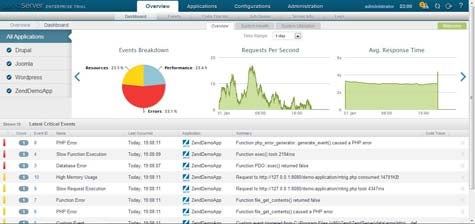PHP has become increasingly popular as an application development environment in the enterprise primarily because it runs faster inside Web applications than either Java or Microsoft.NET and there is no shortage of developers who know how to program in it. Now Zend wants to make it easier to actually manage the deployment of PHP applications.
The company today released an upgrade to the Zend Server platform that is aimed at closing the divide between PHP developers and the IT operations team. At the same time, Zend also released today version 10 of Zend Studio, which makes it easier to develop mobile computing applications that access backend services written in PHP.
According to Zend CEO Andi Gutmans, the primary driver behind the release of version 6.0 of Zend Server is to provide a management mechanism through which developers and IT operations people can identify what issues are impacting the overall DevOps process. Instead of trying to eliminate the need for the IT operations team, Gutmans says the goal should be to promote greater collaboration between developers and IT operations teams in a way that allows each group to focus on their primary task without getting in the way of each other.
Version 10 of Zend Studio, meanwhile, is aimed at extending the value of PHP applications out to mobile computing devices that now need to access Web applications running on cloud computing platforms, says Gutmans. The new version of Zend Studio includes hooks in the mobile computing application that make it easier for Zend Server running in the cloud to automatically inspect, debug and fix mobile computing applications.
In a world where there is no shortage of cool new programming languages, dependency on PHP in the enterprise is actually increasing. In fact, a recent report issued by RedMonk says PHP is now the third most commonly used programming language in the enterprise after Java and Microsoft.NET. In addition, Gutmans says there are over 200 million websites running PHP applications.
PHP may no longer be the coolest language in IT these days. But from a practical perspective, it’s clear it’s not going away anytime soon, which means the time to find a way to manage PHP applications is long overdue.



